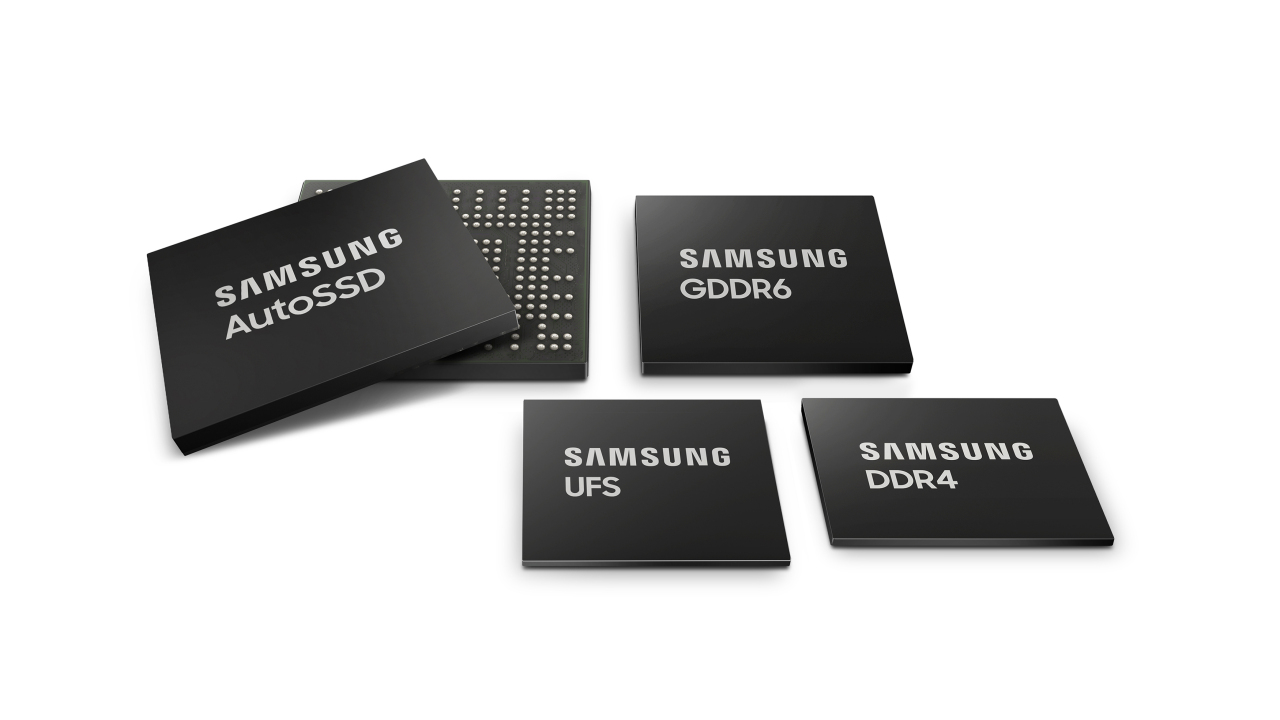
Samsung Electronics said Thursday it has begun mass-producing cutting-edge memory chips for an undisclosed auto manufacturer to power a range of connected features including autonomous driving.
The newest lineup of chips includes 2-gigabyte GDDR6 graphic dynamic random access memory chips, as well as 128-gigabyte universal flash storage. Both products are designed to support autonomous driving features, including advanced driver assistance systems. Samsung unveiled the industry‘s first universal flash storages for self-driving cars in 2017.
Moreover, Samsung unveiled an enhanced lineup for in-vehicle infotainment systems.
Of them, 256-gigabyte ball grid array solid-state drives read seven times faster write twice as fast as their predecessors, embedded MultiMediaCards. Moreover, its 2-gigabyte GDDR6 graphic DRAM -- which could be used both for car infotainment and for autonomous driving – features a data rate of up to 14 gigabits per second per pin. Both products are used for servers and artificial intelligence-powered accelerators.
The latest technology will better support complex processing of multimedia applications and autonomous driving data for an improved connected car driving experience, Samsung said in a statement.
“With the recent proliferation of electric vehicles and the rapid advancement of infotainment and autonomous driving systems, the semiconductor automotive platform is facing a paradigm shift,” said Han Jin-man, executive vice president who leads Memory Global Sales & Marketing at Samsung Electronics.
Han added the replacement cycle of chips is now being shortened, raising the need for requirements for automobile memory solutions to deliver server-class performance.
All new automotive memory solutions have met the AEC-Q100 qualification, enabling a stable operation in extreme temperatures ranging from minus 40 degrees Celsius to 105 degrees Celsius, and completed customer evaluations, according to Samsung.
The newest lineup of chips includes 2-gigabyte GDDR6 graphic dynamic random access memory chips, as well as 128-gigabyte universal flash storage. Both products are designed to support autonomous driving features, including advanced driver assistance systems. Samsung unveiled the industry‘s first universal flash storages for self-driving cars in 2017.
Moreover, Samsung unveiled an enhanced lineup for in-vehicle infotainment systems.
Of them, 256-gigabyte ball grid array solid-state drives read seven times faster write twice as fast as their predecessors, embedded MultiMediaCards. Moreover, its 2-gigabyte GDDR6 graphic DRAM -- which could be used both for car infotainment and for autonomous driving – features a data rate of up to 14 gigabits per second per pin. Both products are used for servers and artificial intelligence-powered accelerators.
The latest technology will better support complex processing of multimedia applications and autonomous driving data for an improved connected car driving experience, Samsung said in a statement.
“With the recent proliferation of electric vehicles and the rapid advancement of infotainment and autonomous driving systems, the semiconductor automotive platform is facing a paradigm shift,” said Han Jin-man, executive vice president who leads Memory Global Sales & Marketing at Samsung Electronics.
Han added the replacement cycle of chips is now being shortened, raising the need for requirements for automobile memory solutions to deliver server-class performance.
All new automotive memory solutions have met the AEC-Q100 qualification, enabling a stable operation in extreme temperatures ranging from minus 40 degrees Celsius to 105 degrees Celsius, and completed customer evaluations, according to Samsung.



![[Herald Interview] 'Amid aging population, Korea to invite more young professionals from overseas'](http://res.heraldm.com/phpwas/restmb_idxmake.php?idx=644&simg=/content/image/2024/04/24/20240424050844_0.jpg&u=20240424200058)
















